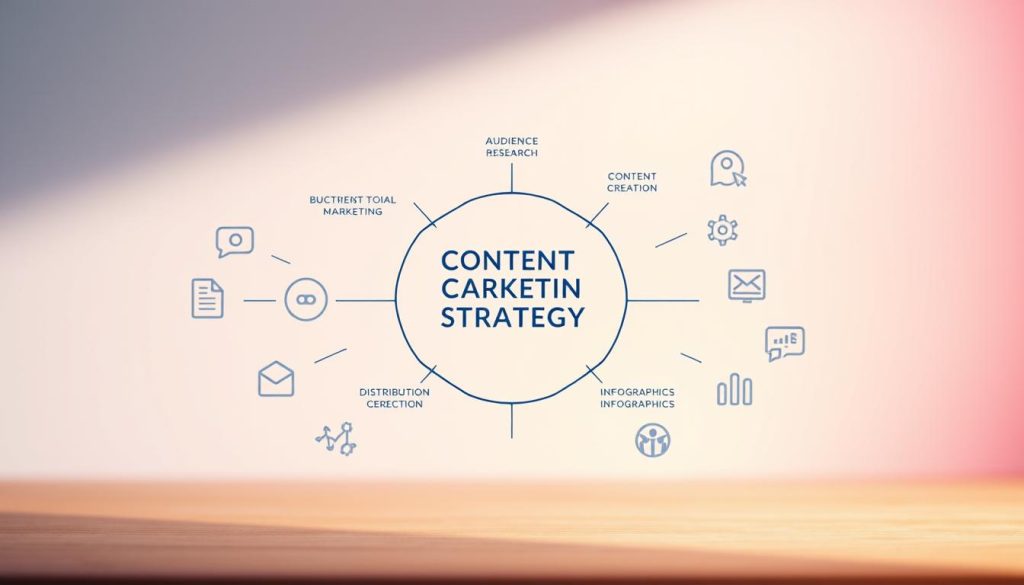In today’s digital landscape, content marketing has become the backbone of modern marketing strategies. With nearly one-third of Americans constantly online, businesses must adapt to reach their target audience. Research from the Pew Research Center highlights this shift, showing a significant increase in online presence since 2015.
Approximately 83% of a purchase decision is made before a buyer even contacts an organization, emphasizing the importance of a well-crafted content strategy. By providing value to potential customers, businesses can establish their brand as a trusted authority in the industry.
Key Takeaways
- Discover why 91% of B2B marketers use content marketing as their primary approach.
- Learn how content marketing generates 3x more leads than traditional marketing.
- Understand the science behind content marketing’s effectiveness.
- Gain actionable insights to transform your marketing approach.
- Achieve sustainable business growth through strategic content creation.
The Evolution of Content Marketing in Today’s Digital Landscape
In the current digital era, the evolution of content marketing is more pronounced than ever. As technology advances and consumer behaviors shift, businesses must adapt their marketing strategies to remain relevant.
Shifting from Traditional to Content-Driven Marketing
The way businesses market their products and services has undergone a significant transformation. Traditional marketing methods are giving way to content-driven strategies that focus on providing value to the audience. This shift is driven by the need to connect with consumers on a more personal level and build trust through meaningful content.
The Rise of Digital Content Consumption
The explosion of digital media has led to an unprecedented level of content consumption across all demographics. Adults in the U.S. spend nearly six hours per day consuming video content, and between 70% and 80% of purchase interactions have entered the digital sphere. Key trends driving this shift include:
- The proliferation of smartphones and mobile devices, changing how people discover, research, and make purchasing decisions.
- Consumers’ expectation for instant access to information, with nearly one-third of Americans reporting they’re “constantly online.”
- The pandemic and rise of remote work accelerating the trend towards digital content marketing.
As a result, businesses must adapt to meet their audience where they already are: consuming digital content. This shift presents new opportunities for brands to connect with their target audiences and drive business results through effective content marketing strategies.

| Key Trends | Impact on Content Marketing |
|---|---|
| Increased mobile device usage | More personalized and accessible content |
| Rise of remote work | Greater emphasis on digital content for engagement |
| Constant online presence | Increased demand for instant information |
Understanding Content Marketing: Definition and Core Components
To grasp the full potential of content marketing, it’s essential to understand its fundamental principles and how they drive business results. We view content marketing as a comprehensive strategy that involves multiple elements working together to achieve specific business objectives.
What Exactly is Content Marketing?
Content marketing is a strategic marketing approach focused on creating and distributing valuable, relevant, and consistent content to attract and retain a clearly defined audience. A best-in-class content marketing plan requires several distinct skills, including subject matter expertise, branding, search engine optimization, strategy and analytics, and production.
Types of Content That Drive Results
Various types of content can drive results, including blog posts, videos, social media posts, and more. The key is to choose the channels that best reach your target audience. Effective content creation involves understanding what type of content resonates with your audience and leveraging that knowledge to inform your marketing efforts.

The Content Marketing Ecosystem
We view content marketing as a complete ecosystem rather than isolated tactics, with each element supporting and enhancing the others. The foundation of this ecosystem is a documented strategy that aligns content efforts with specific business objectives and audience needs. This includes content creation, distribution, promotion, and measurement, all working in harmony to achieve the desired results.
How is Content Marketing Effective: Key Benefits and Advantages
Content marketing is a multifaceted approach that supports the entire customer journey. By creating a comprehensive content marketing strategy, businesses can effectively engage with their audience and drive results.

Cost-Effectiveness Compared to Traditional Marketing
One of the primary advantages of content marketing is its cost-effectiveness. Compared to traditional marketing methods, content marketing allows businesses to reach a wider audience at a lower cost, making it an attractive marketing solution.
Building Trust and Credibility with Your Audience
Content marketing enables businesses to build trust and credibility with their audience by providing valuable and relevant content. This, in turn, fosters engagement and encourages potential customers to become loyal advocates.
Supporting the Entire Customer Journey
We design content marketing strategies that address every stage of the customer journey, from initial awareness through consideration, decision, and retention. This includes:
- Top-of-funnel content that attracts prospects by addressing broad industry challenges.
- Middle-of-funnel content that nurtures relationships by providing deeper insights.
- Bottom-of-funnel content that supports decision-making with case studies and product information.
- Post-purchase content that enhances customer success and encourages loyalty.
By supporting the entirejourney, businesses can create a seamless experience for theirpotential customers.
The Science Behind Content Marketing Success
By leveraging the science behind content marketing, businesses can create campaigns that resonate with their audience and drive meaningful engagement. Storytelling is essential throughout the customer journey, as humans are programmed to respond better to information presented in a story.
How Content Influences Consumer Decision-Making
Content plays a crucial role in influencing consumer decision-making by providing value and triggering emotional responses. We leverage psychological principles in our content to drive engagement and sharing behaviors. For instance, content that evokes high-arousal emotions is more likely to be shared on social media.
- Content that affirms a person’s identity or worldview creates lasting connections with your brand.
- The principle of reciprocity explains why valuable free content creates a sense of obligation.
The Psychology of Engagement and Sharing
The psychology behind sharing content is complex, involving factors like emotional responses and social proof. Content that taps into our innate desire to follow the actions of others is more likely to be shared. By understanding these psychological principles, businesses can create content that resonates with their audience.
| Psychological Principle | Content Marketing Application |
|---|---|
| Reciprocity | Offering valuable free content to create a sense of obligation |
| Social Proof | Using customer testimonials to demonstrate social validation |
| Emotional Connection | Creating content that evokes emotional responses |

“The goal of marketing is to own a word in the prospect’s mind.”
7 Ways Content Marketing Drives Measurable Business Results
Content marketing is instrumental in achieving a range of business objectives, from lead generation to customer retention. By creating and distributing valuable, relevant, and consistent content, businesses can attract and retain a clearly defined audience.

Increasing Brand Awareness and Visibility
Content marketing helps businesses increase their brand awareness and visibility by providing valuable information that resonates with their target audience. This, in turn, establishes the brand as a trusted authority in the industry.
Generating and Nurturing Quality Leads
By creating high-quality, engaging content, businesses can generate and nurture quality leads. This content addresses the needs and concerns of potential customers, guiding them through the sales funnel.
Establishing Thought Leadership
Consistent and insightful content helps businesses establish thought leadership in their industry. As quoted by a renowned marketing expert,
“Content marketing is a powerful tool for businesses to demonstrate their expertise and build trust with their audience.”
Boosting Website Traffic and SEO Performance
Content marketing is crucial for boosting website traffic and improving SEO performance. By optimizing content with relevant keywords, businesses can increase their search engine rankings and drive organic traffic to their site.
Enhancing Customer Engagement and Loyalty
Content marketing enhances customer engagement and loyalty by providing customers with valuable content that addresses their needs and interests. This helps build a loyal customer base.
Supporting Sales Enablement
Well-crafted content supports sales enablement by equipping sales teams with the information they need to effectively engage with potential customers and close deals.
Improving Customer Education and Retention
Educational content is key to improving customer education and retention. As we develop content that helps customers get maximum value from our products or services, it reduces churn and support costs. Educational content demonstrates ongoing value and keeps customers engaged with the brand long after the initial purchase.
Creating an Effective Content Marketing Strategy
Developing a content marketing strategy is crucial for businesses aiming to drive results in today’s digital landscape. A comprehensive strategy ensures that your content efforts are aligned with your overall business goals and resonates with your target audience.
Defining Your Target Audience and Buyer Personas
Understanding your target audience is the foundation of a successful content marketing strategy. We create detailed buyer personas to guide our content creation, ensuring it speaks directly to the needs and interests of our ideal customers. This involves researching demographics, pain points, and behaviors to craft a nuanced understanding of our audience.
Setting Clear Goals and KPIs
Clear goals and KPIs are essential for measuring the success of your content marketing efforts. We set specific, measurable objectives that align with our overall business strategy, whether it’s increasing brand awareness, generating leads, or driving sales. By establishing these KPIs, we can track our progress and make data-driven decisions to optimize our content strategy.
| Goal | KPI | Target |
|---|---|---|
| Increase brand awareness | Social media engagement | 20% increase in followers |
| Generate leads | Form submissions | 50 new leads per quarter |
| Drive sales | Conversion rate | 5% conversion rate |
Developing a Content Calendar and Distribution Plan
A well-planned content calendar and distribution strategy are critical for ensuring consistent production and effective dissemination of content. We develop comprehensive content calendars that align with seasonal trends and business initiatives, and strategic distribution plans that determine the most effective channels for reaching our target audience, whether through email, social media, or our blog.

By integrating these elements, we can create a cohesive content marketing strategy that drives meaningful results for our business.
Content Marketing Success Stories and Case Studies
The effectiveness of content marketing is best illustrated through real-world examples and success stories. Various brands have leveraged this strategy to achieve remarkable results.
B2B Content Marketing Wins
In the B2B sector, content marketing has proven to be particularly effective. For instance, Fidelity Investments has successfully used licensed news content to keep their customers informed and engaged, positioning themselves as a trusted financial resource. This approach not only educates their audience but also builds trust and credibility.
- Fidelity Investments’ use of licensed news stories in their financial content marketing.
- Other B2B companies have seen success with how-to content and buying guides that support customer decision-making.
B2C Content Marketing Victories
In the B2C space, B2C brands have effectively utilized content marketing to build passionate customer communities and drive sales. Successful content campaigns often tap into emotional storytelling and user-generated content, making the brand more relatable and engaging. For example, consumer brands have created viral campaigns through social media, enhancing their visibility and customer interaction.
- Consumer brands creating viral content campaigns through emotional storytelling.
- Retail companies using how-to content and buying guides to reduce purchase anxiety.
Measuring Content Marketing ROI and Effectiveness
The success of content marketing hinges on the ability to measure its performance and adjust strategies accordingly. To achieve this, we need to track key metrics and leverage the right tools and technologies.
Key Metrics to Track for Content Performance
To gauge the effectiveness of our content marketing efforts, we focus on metrics that provide insights into content performance across various channels. We track metrics such as:
- Traffic sources and user behavior on our website
- Engagement metrics on social media, including audience demographics
- Email open rates, click-through rates, and subscriber engagement
By analyzing these metrics, we can identify which content assets are performing well and which need refinement.
Tools and Technologies for Content Analytics
We utilize a range of analytics tools to gain comprehensive insights into content performance. Some of the key tools include:
| Tool | Purpose |
|---|---|
| Google Analytics | Tracking website content performance, traffic sources, and conversion paths |
| Social Media Analytics Platforms | Analyzing content engagement and audience demographics across social channels |
| Email Marketing Platforms | Monitoring email open rates, click-through rates, and subscriber engagement |
By leveraging these tools and technologies, we can make data-driven decisions to optimize our content marketing strategy.
Conclusion: The Future of Content Marketing
The landscape of content marketing is evolving, but its core value remains unchanged. As we move forward, we’re seeing emerging technologies and shifting consumer behaviors shape the industry. With 91% of B2B content marketers using content marketing to reach customers, it’s clear that this strategy is here to stay.
We anticipate that personalization will become increasingly sophisticated, with AI-driven content experiences. Video and interactive content will continue to grow in importance. The most successful brands will integrate content as a core part of their customer experience and business model, focusing on valuable, relevant content that genuinely helps their audience.
